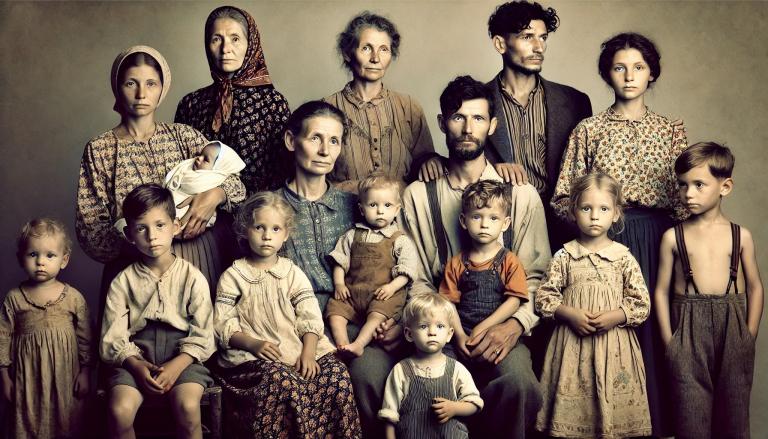A life without birth control: a baby is born, sleeps with the mother, breastfeeding at will and carried close to the body of the mother most of the time. Because households are large, generally consisting of multiple families, children grow up surrounded by numerous “aunties and uncles,” all of whom participate in the rearing of the child. Children eat what is available, never very much.

Dear Thoughtful Pastor: I have family members who believe that using birth control is sinful because children are a blessing from God. They believe that people who use birth control are not only sinful but exceedingly selfish for not wanting children. They also believe that barrenness is a curse from God. I think they are wrong but am not sure. Can you help out here?
There are two related issues here: the curse of barrenness and intentionality in limiting family size. Let’s start with barrenness.
Few people today, especially in the US, know actual hunger to the point of near starvation. People may eat poorly, but food is plentiful and easy to access.
For most of history and in parts of the world today, food scarcity presents real danger. People must have fertile crops and fertile livestock and fertile women to survive. With few labor saving tools available, farming and animal husbandry were labor-intensive occupations.
Children participated in the family work, their lives nearly immediately intertwined with the primary concern of getting enough food. Subsistence economies will not support extended childhoods. Everyone contributes to the family well-being.
So when a woman was for whatever reason unable to bear children, that inability put the entire household at risk.
Crop failures periodically swept over the world during the times the Scriptures were written. People, desperate for food, saw the resultant famines as a punishment from God. The equation was simple: Abundant crops meant God’s blessing. Scarce crops meant an angry God laying curses upon weary, starving people.
The same equation applied to women. A sign of blessing: a woman bearing multiple offspring. A woman with none? She had done something to anger God in order to deserve being cursed that way. Tough place to be.
Multiple biblical stories begin with the “barren woman” theme. This narrative technique would have caused the ancient listeners to sit up and take notice. Something has gone awry. Generally, after the pronouncement of barrenness would come the pronouncement of promise. A healthy, live birth of some sort of savior figure followed, meaning a change in the fortunes of the family and of the Israelites.
Child-rearing and birth control then and now.
Now, let’s take a moment and compare child-rearing then and child-rearing now.
Then: a baby is born, sleeps with the mother, breastfeeding at will and carried close to the body of the mother most of the time. Because households are large, generally consisting of multiple families, children grow up surrounded by numerous “aunties and uncles,” all of whom participate in the rearing of the child. Children eat what is available, never very much.
The children themselves quickly learn their tasks by accompanying older siblings and adults as they labor. When a young man marries, he brings his bride back to his family of origin where she will begin having babies to help grow the household.
Children are never the center of attention. Family survival is at stake and is the primary motivator. Many children die in infancy or as toddlers.
Today: after the “gender reveal” party, the expectant parents, isolated from the rest of their family members, lay out an excessive amount of money buying just the right clothes, toys, cribs, car seats and prams for their child. After birth, the child’s demands take over the household. Sleep problems abound because the child has to sleep alone.
The parent spends countless hours in mindless play with the child, and reads the same book nightly for years. Parents prepare special meals for the finicky child since there is food to spare and much variety.
Parents take on extra jobs to afford special educational camps and private school tuition to give their offspring a head start in the world. Without extended family nearby, isolated and exhausted parents often give in child’s incessant whining for the latest toys and electronics and visits to theme parks in order to get some peace and quiet.
They give up hope of retiring when they co-sign student loans for expensive educations that leave the young people incapable of finding employment afterward.
Our world: radically different from the biblical world
That’s our world: significantly different from when the biblical texts were written.
We know inability to bear children comes from multiple sources, and is often the man’s fault, not the woman’s. Children are no longer economic assets, but economic liabilities. Of course, we love them but we do not expect them to be contributors to the family financial bottom line.
So is birth control selfish and evil or just a matter of practicality? Well, you can decide, but my vote is on practicality. If you live on a farm without labor saving devices, don’t plan to educate your kids, don’t have access to modern medical care and expect most of your offspring to die before age five, pop ‘em out as fast as you can.
But for the rest of us? Sometimes you have to ignore family pressure and make your own decisions, having thought through all options.
 [Note: a version of this column is scheduled to run in the Sept 16, 2016, edition of the Denton Record Chronicle. The Thoughtful Pastor, AKA Christy Thomas, welcomes all questions for the column. Although the questioner will not be identified, I do need a name and verifiable contact information in case the newspaper editor has need of it. Please email questions to: [email protected].]
[Note: a version of this column is scheduled to run in the Sept 16, 2016, edition of the Denton Record Chronicle. The Thoughtful Pastor, AKA Christy Thomas, welcomes all questions for the column. Although the questioner will not be identified, I do need a name and verifiable contact information in case the newspaper editor has need of it. Please email questions to: [email protected].]














